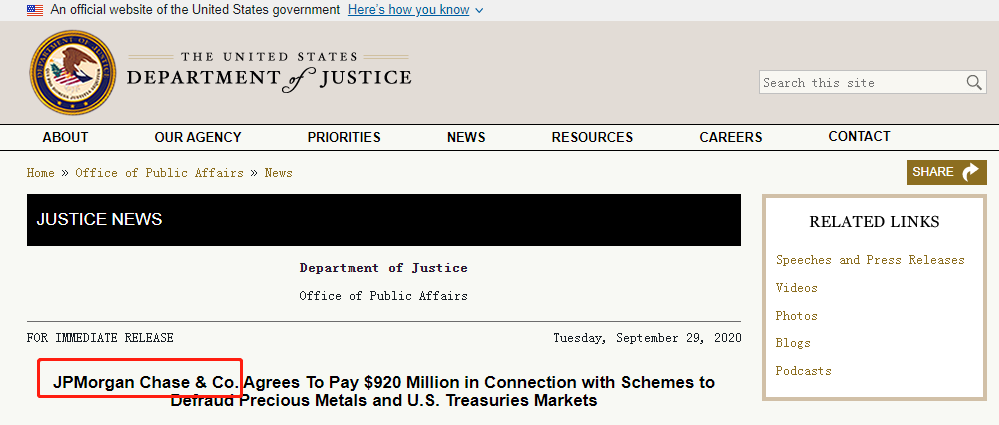
https://www.justice.gov/opa/pr/jpmorgan-chase-co-agrees-pay-920-million-connection-schemes-defraud-precious-metals-and-us
Department of Justice
Office of PublicAffairs
FOR IMMEDIATERELEASE
Tuesday,September 29, 2020
JPMorgan Chase & Co. Agrees To Pay$920 Million in Connection with Schemes to Defraud Precious Metals and U.S.Treasuries Markets
JPMorgan Chase & Co. (JPMorgan), aNew York, New York-based global banking and financial services firm, hasentered into a resolution with the Department of Justice to resolve criminalcharges related to two distinct schemes to defraud: the first involving tens ofthousands of episodes of unlawful trading in the markets for precious metalsfutures contracts, and the second involving thousands of episodes of unlawfultrading in the markets for U.S. Treasury futures contracts and in the secondary(cash) market for U.S. Treasury notes and bonds.
JPMorgan entered into a deferredprosecution agreement (DPA) in connection with a criminal information filedtoday in the District of Connecticut charging the company with two counts ofwire fraud. Under the terms of the DPA, JPMorgan will pay over $920million in a criminal monetary penalty, criminal disgorgement, and victimcompensation, with the criminal monetary penalty credited against payments madeto the Commodity Futures Trading Commission (CFTC) under a separate agreementwith the CFTC being announced today and with part of the criminal disgorgementcredited against payments made to the Securities Exchange Commission (SEC)under a separate agreement with the SEC being announced today.
“For over eight years, traders on JPMorgan’s precious metals and U.S. Treasuries desks engaged in separate schemesto defraud other market participants that involved thousands of instances ofunlawful trading meant to enhance profits and avoid losses,” said ActingAssistant Attorney General Brian C. Rabbitt of the Justice Department’sCriminal Division. “Today’s resolution — which includes a significantcriminal monetary penalty, compensation for victims, and requires JP Morgan todisgorge its unlawful gains — reflects the nature and seriousness of the bank’soffenses and represents a milestone in the department’s ongoing efforts toensure the integrity of public markets critical to our financial system.”
“JPMorgan engaged in two separateyears-long market manipulation schemes,” said U.S. Attorney John H. Durham ofthe District of Connecticut. “Not only will the company pay a substantialfinancial penalty and return money to victims, but this agreement requiresJPMorgan to self-report violations of the federal anti-fraud laws and cooperatein any future criminal investigations. I thank the FBI for its dedicationin investigating these deceptive trading practices and other sophisticatedfinancial crimes.”
“For nearly a decade, a significantnumber of JP Morgan traders and sales personnel openly disregarded U.S. lawsthat serve to protect against illegal activity in the marketplace,” saidAssistant Director in Charge William F. Sweeney Jr. of the FBI’s New York FieldOffice. “Today’s deferred prosecution agreement, in which JP Morgan Chaseand Co. agreed to pay nearly one billion dollars in penalties and victimcompensation, is a stark reminder to others that allegations of this naturewill be aggressively investigated and pursued.”
According to admissions and courtdocuments, between approximately March 2008 and August 2016, numerous tradersand sales personnel on JPMorgan’s precious metals desk located in New York,London, and Singapore engaged in a scheme to defraud in connection with thepurchase and sale of gold, silver, platinum, and palladium futures contracts(collectively, precious metals futures contracts) that traded on the New YorkMercantile Exchange Inc. and Commodity Exchange Inc., which are commoditiesexchanges operated by the CME Group Inc. In tens of thousands of instances,traders on the precious metals desk placed orders to buy and sell preciousmetals futures contracts with the intent to cancel those orders beforeexecution, including in an attempt to profit by deceiving other marketparticipants through injecting false and misleading information concerning theexistence of genuine supply and demand for precious metals futures contracts. In addition, on certain occasions, traders on the precious metals deskengaged in trading activity that was intended to deliberately trigger or defendbarrier options held by JPMorgan and thereby avoid losses.
One of the traders on the preciousmetals desk, John Edmonds, 38, of Brooklyn, New York, pleaded guilty onOct. 9, 2018, to one count of commodities fraud and one count ofconspiracy to commit wire fraud, commodities fraud, commodities pricemanipulation, and spoofing, and his sentencing, at this time, has not beenscheduled before U.S. District Judge Robert N. Chatigny of the District ofConnecticut. Another one of the traders on the precious metals desk,Christian Trunz, 35, of New York, New York, pleaded guilty onAug. 20, 2019, to one count of conspiracy to engage in spoofing and one countof spoofing in connection with his precious metals futures contracts trading atJPMorgan and another financial services firm, and his sentencing is scheduledfor Jan. 28, 2021, before U.S. District Judge Sterling Johnson of the EasternDistrict of New York.
Finally, as part of the investigation,the department obtained a supersedingindictment on Nov. 15, 2019 against three former JPMorgantraders, Gregg Smith, Michael Nowak, and Christopher Jordan, and one formersalesperson, Jeffrey Ruffo, in the Northern District of Illinois that chargedthem for their alleged participation in a racketeering conspiracy and otherfederal crimes in connection with the manipulation of the precious metalsfutures contracts markets. An indictment is merely an allegation and alldefendants are presumed innocent until proven guilty beyond a reasonable doubtin a court of law.
Also according to admissions and courtdocuments, between approximately April 2008 and January 2016, traders onJPMorgan’s U.S. Treasuries desk located in New York and London engaged in ascheme to defraud in connection with the purchase and sale of U.S. Treasuryfutures contracts that traded on the Chicago Board of Trade, which is acommodities exchange operated by the CME Group Inc., and of U.S. Treasury notesand bonds traded in the secondary cash market (the U.S. Treasury futures,notes, and bonds, collectively, U.S. Treasury Products). In thousands ofinstances, traders on the U.S. Treasuries desk placed orders to buy and sellU.S. Treasury Products with the intent to cancel those orders before execution,including in an attempt to profit by deceiving other market participantsthrough injecting false and misleading information concerning the existence ofgenuine supply and demand for U.S. Treasury Products.
As part of the DPA, JPMorgan, and itssubsidiaries JPMorgan Chase Bank, N.A. (JPMC) and J.P. Morgan Securities LLC(JPMS) have agreed to, among other things, continue to cooperate with the FraudSection and the U.S. Attorney’s Office for the District of Connecticut in anyongoing or future investigations and prosecutions concerning JPMorgan, JPMC,JPMS, and their subsidiaries and affiliates, and their officers, directors,employees and agents. As part of its cooperation, JPMorgan, JPMC,and JPMS are required to report evidence or allegations of conduct which mayconstitute a violation of the wire fraud statute, the anti-fraud, anti-spoofingand/or anti-manipulation provisions of the Commodity Exchange Act, thesecurities and commodities fraud statute, and federal securities lawsprohibiting manipulative and deceptive devices. In addition, JPMorgan,JPMC, and JPMS have also agreed to enhance their compliance program wherenecessary and appropriate, and to report to the government regardingremediation and implementation of their enhanced compliance program.
The department reached this resolutionwith JPMorgan based on a number of factors, including the nature andseriousness of the offense conduct, which spanned eight years and involved tensof thousands of instances of unlawful trading activity; JPMorgan’s failure tofully and voluntarily self‑disclose the offense conduct to the department;JPMorgan’s prior criminal history, including a guilty plea on May 20, 2015, forsimilar misconduct involving manipulative and deceptive trading practices inthe foreign currency exchange spot market (FX Guilty Plea); and the fact thatsubstantially all of the offense conduct occurred prior to the FX GuiltyPlea.
JPMorgan received credit for itscooperation with the department’s investigation and for the remedial measurestaken by JPMorgan, JPMC, and JPMS, including suspending and ultimatelyterminating individuals involved in the offense conduct, adopting heightenedinternal controls, and substantially increasing the resources devoted tocompliance. Significantly, since the time of the offense conduct, andfollowing the FX Guilty Plea, JPMorgan, JPMC, and JPMS engaged in a systematiceffort to reassess and enhance their market conduct compliance program andinternal controls. These enhancements included hiring hundreds of newcompliance officers, improving their anti-fraud and manipulation training andpolicies, revising their trade and electronic communications surveillanceprograms, implementing tools and processes to facilitate closer supervision oftraders, taking into account employees’ commitment to compliance in promotionand compensation decisions, and implementing independent quality assurancetesting of non-escalated and escalated surveillance alerts. Based onJPMorgan’s, JPMC’s and JPMS’ remediation and the state of their complianceprogram, the department determined that an independent compliance monitor wasunnecessary.
Today, the CFTC announced a separatesettlement with JPMorgan, JPMC, and JPMS in connection with a related, parallelproceeding. Under the terms of that resolution, JPMorgan agreed to payapproximately $920 million, which includes a civil monetary penalty ofapproximately $436 million, as well as restitution and disgorgement thatwill be credited to any such payments made to the department under theDPA. Also, the SEC announced today a separate settlement with JPMS inconnection with a related, parallel proceeding regarding trading activity in thesecondary cash market for U.S. Treasury notes and bonds. Under the termsof that resolution, JPMS agreed to pay $10 million in disgorgement and a civilmonetary penalty of $25 million.
The FBI’s New York Field Officeinvestigated this case. Assistant Chief Avi Perry and Trial AttorneyMatthew F. Sullivan of the Fraud Section and Assistant U.S. Attorney JonathanFrancis of the District of Connecticut prosecuted the case.
Individuals who believe that they may bea victim in this case should visit the Fraud Section’s Victim Witness websiteat https://www.justice.gov/criminal-vns/case/jpmorgan-dpa orcall (888) 549-3945.
The year 2020marks the 150th anniversary of the Department of Justice. Learn moreabout the history of our agency at www.Justice.gov/Celebrating150Years.


